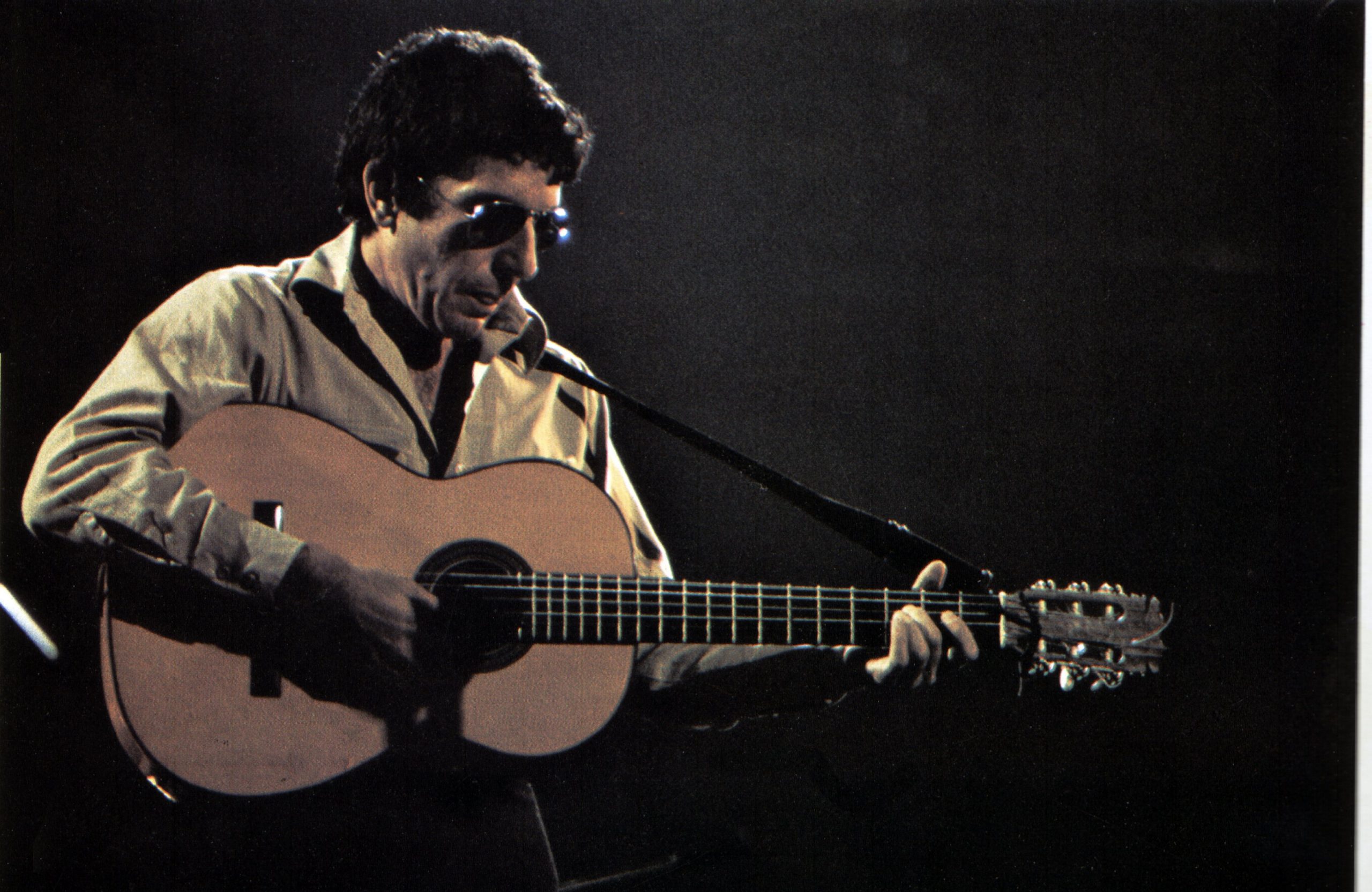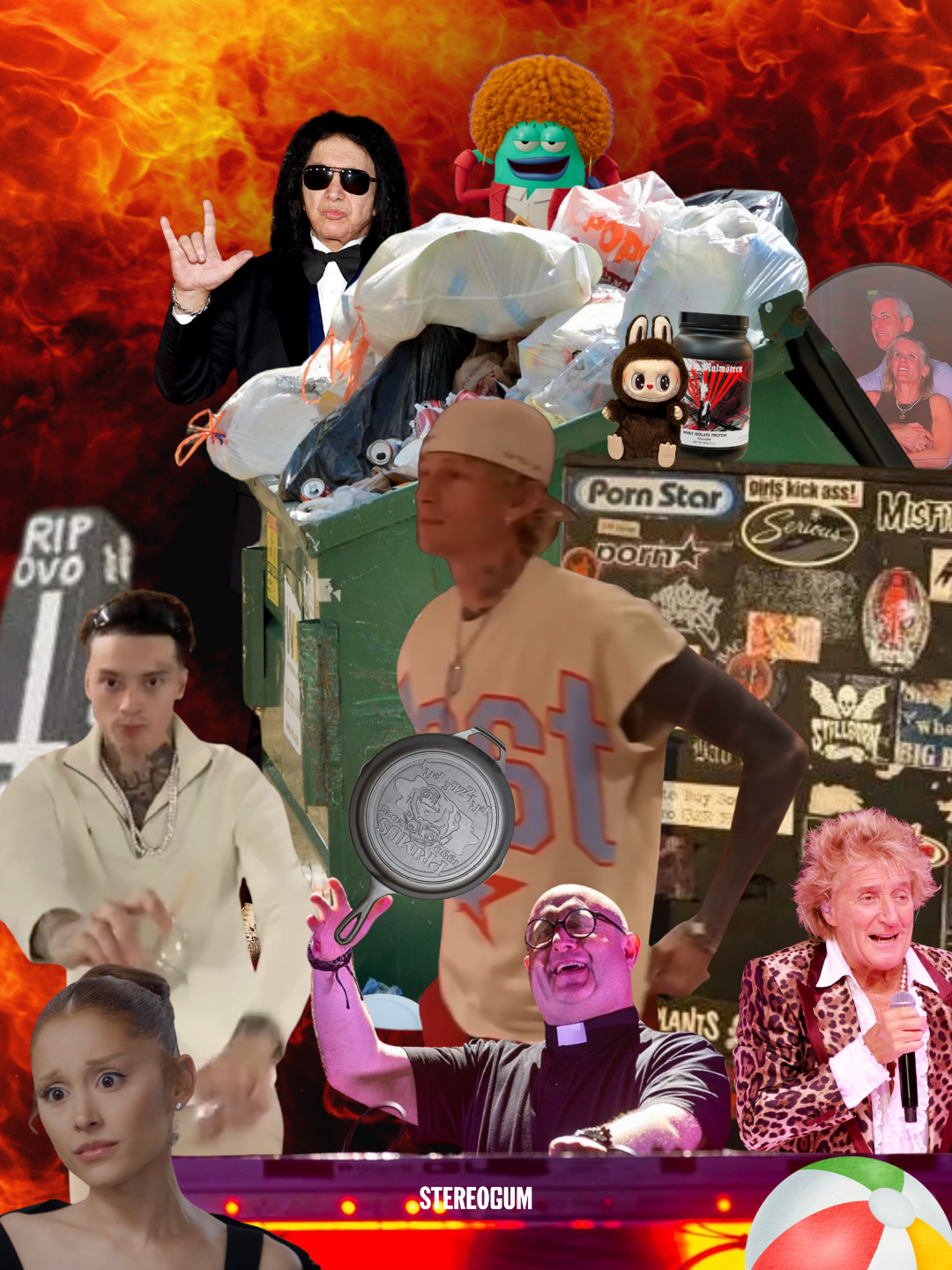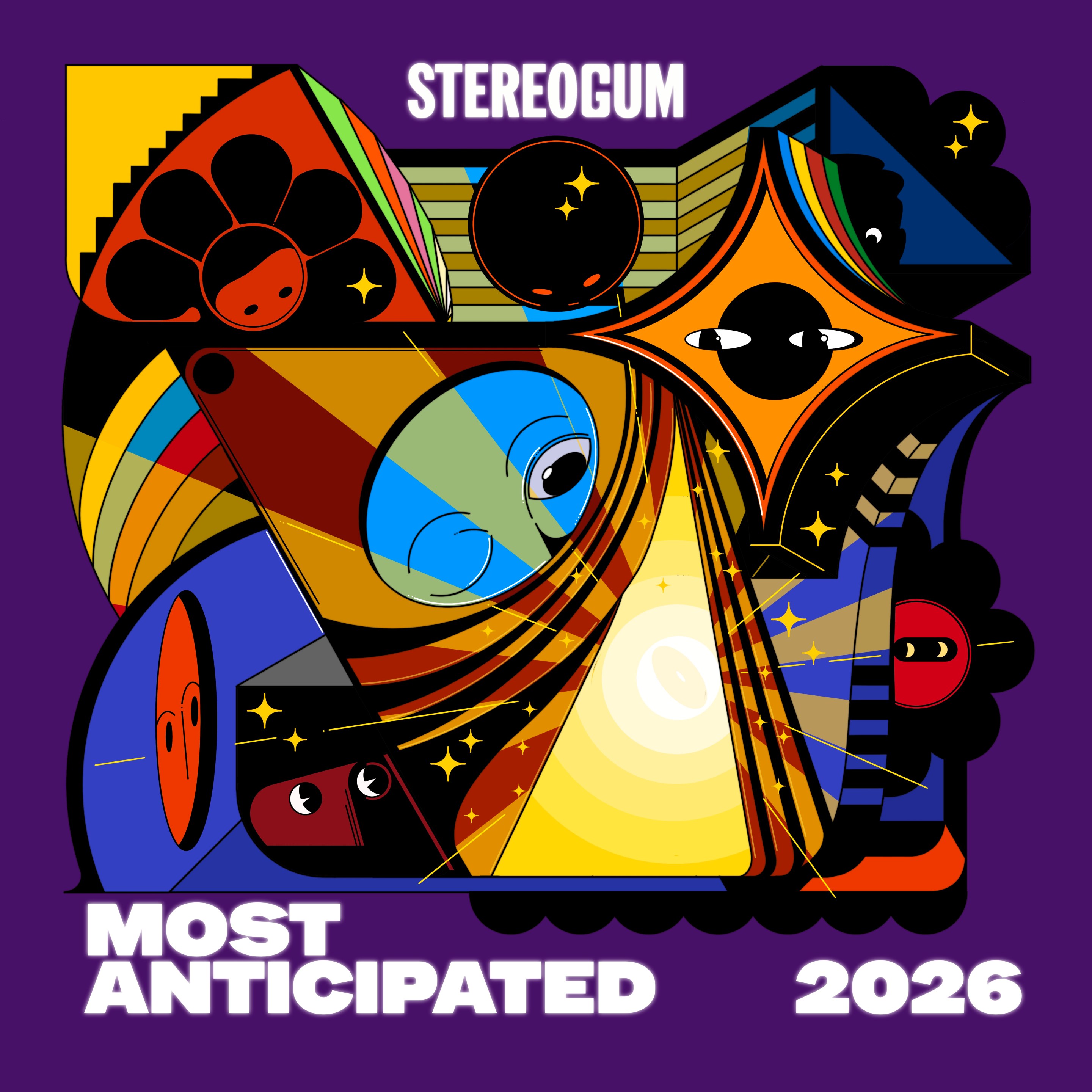When he was still alive, Leonard Cohen's music carried the sort of somber gravity that we usually only attach to musicians once they've died. Death was always one of Cohen's great subjects; sex and deception and the acceptance and understanding melancholy were others. The news of his death hit me like a sledgehammer last night, but it really shouldn't. In both his life and his work, Cohen had long prepared for his own passing; David Remnick's stunning New Yorker profile of the man famously ended with Cohen telling Remnick, "I am ready to die. I hope it’s not too uncomfortable. That’s about it for me." And on "You Want It Darker," a song that came out just a few months ago, Cohen sang, "I'm ready, my Lord."
There are plenty of reasons to be sad this week, but reflecting on Cohen's passing doesn't make me sadder. If anything, it makes me feel better. Very few of us get to plan our exits with the sort of grace and acceptance that Cohen did. And like David Bowie with Blackstar, Cohen was able to give us a final word that he had to know would be his last. You Want It Darker is a whole lot more resonant now that we know it's the last thing we'll hear from Cohen.
In the past, when titanic musical figures have died, my way of paying tribute has been to dig through their careers and pick out a few moments that I like thinking about. They're not these people's best moments necessarily, but taken together, they can help us understand what these people brought to our world. I've written pieces like this about Adam Yauch, Lou Reed, David Bowie, and Prince. And now I'm writing one about Leonard Cohen, a man we'll still be trying to figure out decades after his departure.
1. THE ISLE OF WIGHT FESTIVAL
In 1970, Cohen stepped onstage in front of an estimated 600,000 people -- most of whom had figured out how to get in for free -- at a festival that threatened to turn disastrous. Cohen started his set at the third Isle Of Wight festival in the wee hours of the morning, playing to a crowd that had been booing bigger stars offstage all weekend. That same night, Donovan and the Moody Blues and Jethro Tull and Jimi Hendrix and Joan Baez had already performed. Cohen had to be woken up to play, and he walked onstage rumpled and sweaty and intense, fronting a rambling country-rock band who gave off the distinct impression that its members had just met one another.
The result, of course, was a masterful and legacy-defining set, the sort of thing that people still speak about in hushed tones. Cohen was already on his way toward middle age when he played that show, and he gave off the sense that the spectacle in front of him didn't impress him that much. He asked people in the crowd to light matches so that he could see them, and then he took in the sea of floating lights and commented that a lot of them must have forgotten their matches. And while the filmed evidence of that performance can't be any substitute for being there, it's still enrapturing. Here, watch:
[videoembed size="full_width" alignment="center"][/videoembed]
2. THE McCABE AND MRS. MILLER OPENING CREDITS
Robert Altman's 1971 film helped demystify the Old West in the popular imagination, and Cohen, a great demystifier himself, played a crucial role. The first thing we see in the movie is a dissolute Warren Beatty riding his horse through a miserable, rainy pine forest, and the first thing we hear is the fluttering guitar of Cohen's "The Stranger Song," its tones suggesting a sort of forbidding seduction. Cohen's songs would turn up on soundtracks again and again, but nobody made more iconic use of them than Altman did.
[videoembed size="full_width" alignment="center"][/videoembed]
3. THE KURT COBAIN SHOUTOUT
I could be wrong on this, but as far as I can remember, the only time Kurt Cobain ever lyrically namechecked another artist, it was on Nirvana's "Pennyroyal Tea," and it was Cohen: "Give me a Leonard Cohen afterworld / So I can sigh eternally." A Leonard Cohen afterworld sounds like a nice place to be. It sounds a whole lot better than where we are right now, anyway.
4. THE CASUAL DISRESPECT OF THE BEATLES
In that New Yorker piece -- which really, honestly, is a must-read -- Cohen mentions that he didn't give a damn about the Beatles. In doing so, he offers the most eloquent form of player-hating that I've ever encountered:
I’m interested in things that contribute to my survival. I had girlfriends who really irritated me by their devotion to the Beatles. I didn’t begrudge them their interest, and there were songs like "Hey Jude" that I could appreciate. But they didn’t seem to be essential to the kind of nourishment that I craved.
Cohen, keep in mind, was very much a grown-up by the time the Beatles appeared. And while people treat it like an objective truth that the Beatles were the most important thing to ever happen to music, it's not like everyone had to like them. I prefer to imagine Cohen as someone who would sigh and roll his eyes when someone put Revolver on at a party. I prefer to think of him as someone who was listening to the things he really was listening to at that time: Ray Charles, Edith Piaf, Bessie Smith, the Platters' "The Great Pretender," Patti Page's "Tennessee Waltz." And as it happens, the last song that Cohen ever sang in public was a song like that, an oldie full of understated grace. In December of 2013, he played his final show in Auckland, New Zealand, and he ended it with a warm and loving cover of the Drifters' "Save The Last Dance For Me."
[videoembed size="full_width" alignment="center"][/videoembed]
5. THE SURPRISE AMERICAN IDOL APPEARANCE
I used to write American Idol recaps for The Village Voice, and doing that, you become a little numb to the grand vocal theatrics that were such an important part of that show. But in the middle of the show's seventh season, Jason Castro, a goofy and seemingly perma-stoned dreadlocked kid from Texas, sang a perfectly lovely version of Cohen's iconic "Hallelujah." It wasn't the best cover of Hallelujah; that will always be Jeff Buckley's acrobatically fragile take on the song. And Castro's version of the song was really a more restrained version of Buckley's cover; the two were so similar that iTunes sales of Buckley's "Hallelujah," after that Idol performance, were enough to propel it into the charts for the first time. But Castro's version still made for a quietly magical moment in the sort of context where those didn't often arrive.
[videoembed size="full_width" alignment="center"][/videoembed]
6. THE EMAIL TO MARIANNE
Cohen wrote his 1967 song "So Long, Marianne" about Marianne Ihlen, a Norwegian woman with whom he'd had an affair, one that began when they were both living on the Greek island of Hydra in the mid-'60s. They broke up eventually, but they stayed close throughout their lives. This past summer, Ihlen died of cancer. Before Ihlen died, Cohen sent her an email, and it said this:
Well Marianne, it's come to this time when we are really so old and our bodies are falling apart and I think I will follow you very soon. Know that I am so close behind you that if you stretch out your hand, I think you can reach mine. And you know that I've always loved you for your beauty and your wisdom, but I don't need to say anything more about that because you know all about that. But now, I just want to wish you a very good journey. Goodbye old friend. Endless love, see you down the road.
She had time to hear the email before she died, and her friends, with Cohen's blessing, shared their whole interaction with the public. You can read more about it here, and then you can hope that you and your loved ones will approach the inevitable with that sort of joy and acceptance.
7. THE SONNY ROLLINS PERFORMANCE
Cohen wasn't a big collaborator, but there were exceptions. On a 1989 episode of the NBC late-night show Night Music, Cohen performed alongside the bugged-out jazz titan Sonny Rollins. Here are the two of them, playing a molten and fascinating version of "Who By Fire":
[videoembed size="full_width" alignment="center"][/videoembed]
8. THE PHIL SPECTOR ALBUM
By the late '70s, just about everyone in the music industry knew to stay the fuck away from Phil Spector, the diabolical shitbag and pop genius who'd pioneered the girl-group sound in the previous decade. But a few people did go to work with Spector; the Ramones, for instance, teamed up with him to record their fascinatingly strange album End Of The Century. And before that, he and Cohen made Death Of A Ladies' Man, a lush and rapturous and bizarre 1977 LP.
The recording did not go smoothly. In one famous episode, Spector pointed a loaded gun at Cohen's throat and said, "I love you Leonard." Cohen, dry even in the most extreme circumstances, looked back at Spector and said, "I hope you love me, Phil." And then the two of them recorded a song called "Don't Go Home With Your Hard-On."
[videoembed size="full_width" alignment="center"][/videoembed]
9. THE GLIMPSE OF AN INCORRIGIBLE FLIRT IN THE WILD
The 1972 documentary Bird On A Wire captured two different moments of Cohen gently rebuffing stunningly beautiful women who were coming onto him really strongly backstage at a show in Tel Aviv. They capture a form of erudite, sardonic, friendly masculine sexuality that none of us will ever even approach. It is so much fun to watch.
[videoembed size="full_width" alignment="center"][/videoembed]
10. THE SECOND GLIMPSE OF AN INCORRIGIBLE FLIRT IN THE WILD
In 1995, The New York Times' Jon Pareles interviewed Cohen in a Los Angeles restaurant. Cohen was reciting a poem when this happened:
Tables are close together, and the woman at the next one leans closer to hear Mr. Cohen's verses. When he notices, he turns to her, stares deep into her eyes, and continues:
I'll find you though you climb the very heights of failure peak,
I'll lift you from the midst of your invincible defeat,
But hold me when the darkness sings and when our faith is weak
We'll bathe together in those springs a thousand kisses deep. He has charmed the woman. "Are you the author?" she asks. "Has that been published?"
"It doesn't exist yet on paper," Mr. Cohen says. "I'm just in the midst of it, but you're very kind to be so receptive to it. The poem will appear somewhere, God willing."
"Do you have a publisher?" the woman persists.
"I'm a songwriter," Mr. Cohen says, "and there's an album coming out of different artists who are doing my songs. It's called Tower Of Song." (The album was released in late September by A & M Records.)
"What kind of music is it?"
Mr. Cohen considers the question. "It's, um, ballads," he says gravely.
"Your voice is music enough," the woman says. "You know, you seem to be very romantic, but with your head not screwed on tight. Does it get you into trouble?"
"Continually," Mr. Cohen replies, with the smile of someone who enjoys his troubles.
This was the sort of exchange that music writers dream of witnessing when we're writing profiles.
11. THE PUMP UP THE VOLUME SOUNDTRACK
Cohen's 1988 song "Everybody Knows" is one of the many, many Cohen songs that says some powerful, important things about this moment in history. (For the same reasons, don't sleep on 1992's "Democracy.") And "Everybody Knows" was also the theme music that Christian Slater, playing the pirate-radio shock jock Happy Harry Hard-On, used as his radio show's theme music in 1990's Pump Up The Volume, a stupid movie that I love dearly. Those songs in McCabe And Mrs. Miller might be Cohen's most iconic movie-soundtrack moment, but "Everybody Knows" in Pump Up The Volume is the one that means the most to me personally.
[videoembed size="full_width" alignment="center"][/videoembed]
12. THE "HALLELUJAH" VIDEO
Cohen was never a music-video artist, even if he was one of the few '60s and '70s giants who went on to do great work in the '80s and '90s. But this video of 1984's "Hallelujah" -- I honestly don't know if it's a proper music video or a TV performance that ended up on YouTube or what -- stuck with me since I first saw it in the early days of online video. Cohen is so wizened and elegant, and the stage set is so grand but still understated, that it makes an already-mesmerizing song that much more powerful. And this might be a good place to mention that, while Cohen was never half the pure singer that Jeff Buckley was, I still prefer his original cover to Buckley's beloved (and, yes, great) cover. Cohen had a sort of dark glamor working for him, and a winking unseriousness, that Buckley never even tried to capture.
[videoembed size="full_width" alignment="center"][/videoembed]
13. THE CONVENIENCE STORE PHOTO
There are no bad photos of Leonard Cohen, but this is the best one.
https://twitter.com/huahsu/status/796892237665890307
14. "THE MODESTY OF YOUR INTEREST"
Cohen always had an audience, but he was never really a star. That changed a bit in the late '80s, when his brooding synth-pop LP I'm Your Man started to gain commercial steam in Europe. When that happened, Cohen's label CBS gave him some kind of award for finally selling some records. He responded by thanking the label heads and saying, "Thank you. I have always been touched by the modesty of your interest in my work."
15. THE NINA SIMONE COVER
Real recognize real. Cohen's music left so much room for ambiguity that he was an ideal cover-song candidate, and many, many other artists put their own spins on his work. (He basically got a recording contract in the first place because of Judy Collins' cover of "Suzanne." Her recorded version, from the 1969 album To Love Somebody, is fascinating for its jazz phrasing and its embellished arrangement. But I prefer this live version, which does a lot of the same things in a more stripped-down fashion. Most artists used Cohen's songs as opportunities for reverie. Simone treated "Suzanne" like a playground.
[videoembed size="full_width" alignment="center"][/videoembed]
16. THE SONGS OF LOVE AND HATE BACK COVER
A great, economical short story.
The rain falls down on last year's man. pic.twitter.com/110BLTF8Uj
— Sean Fennessey (@SeanFennessey) November 11, 2016
17. THE CHARLIE DANIELS CONNECTION
Last night, in a depression fog, I was clicking around Twitter to see what people were saying about Cohen (mostly to find material for this piece), and I saw a farewell message from an unexpected source: Charlie Daniels, the right-wing Southern country-rocker and fiddle virtuoso -- you know, the "Devil Went Down To Georgia" guy:
Just got word that Leonard Cohen has passed away.
Rest in peace Buddy,i learned a lot about music from you.— Charlie Daniels (@CharlieDaniels) November 11, 2016
As it turns out, Daniels played bass on Songs From A Room and Songs Of Love And Hate, and he was part of Cohen's backing band during that Isle Of Wight show. People contain multitudes. Even the ones who go out of their way to present themselves as cartoon characters have had life experiences that would impress us.
18. THE SELF-EFFACING POEM
Leonard Cohen had jokes.
a poem by Leonard Cohen pic.twitter.com/HZY6RPqtmQ
— priscilla page (@BBW_BFF) November 11, 2016
19. THE AGELESSNESS
By the time Leonard Cohen became a recording artist, he had lived a full life -- living around the world, publishing novels and poems, acquiring the sort of worldly experience that he had in his voice when the world first heard him. Cohen was 33 by the time he released his first album, and that New Yorker profile quotes a record label exec who looked at Cohen and said, "Turn around, kid. Aren’t you a little old for this?" He would go on to record for the next 50 years.
20. "THE PARTISAN"
I've been trying to structure this piece in such a way that I'm not talking about individual songs, simply because Cohen had so many great ones that it feels insufficient to highlight just a few of them. But "The Partisan" deserves special mention. Even without Cohen's passing, the past week would make an ideal time to immerse yourself completely in the man's work. He had a way of finding comfort and even ecstasy in darkness, and we're all going to need to do that now.
"The Partisan" is from Cohen's 1969 sophomore album Songs From A Room. Over ghostly hints of accordion and Cohen's own fluttering, flamenco-influenced guitar, Cohen sings from the perspective of a soldier who's being hunted behind enemy lines: "There were four of us this morning / I am the only one this evening / But I must go on / The frontiers are my prison." The song isn't Cohen's own; it's a cover, translated into English, of an old French Resistance song written during World War II. But the eerie, resolute calm in Cohen's voice belongs entirely to him. He ends the song with something that sounds like hope, or like vengeance: "Freedom soon will come / Then we'll come from the shadows."
[videoembed size="full_width" alignment="center"][/videoembed]






